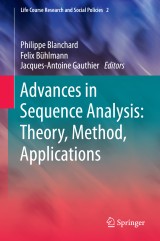Details

Advances in Sequence Analysis: Theory, Method, Applications
Life Course Research and Social Policies, Band 2
|
CHF 153.50 |
|
| Verlag: | Springer |
| Format: | |
| Veröffentl.: | 02.07.2014 |
| ISBN/EAN: | 9783319049694 |
| Sprache: | englisch |
Dieses eBook enthält ein Wasserzeichen.
Beschreibungen
<p>This book gives a general view of sequence analysis, the statistical study of successions of states or events. It includes innovative contributions on life course studies, transitions into and out of employment, contemporaneous and historical careers, and political trajectories. The approach presented in this book is now central to the life-course perspective and the study of social processes more generally.</p><p>This volume promotes the dialogue between approaches to sequence analysis that developed separately, within traditions contrasted in space and disciplines. It includes the latest developments in sequential concepts, coding, atypical datasets and time patterns, optimal matching and alternative algorithms, survey optimization, and visualization.</p><p>Field studies include original sequential material related to parenting in 19th-century Belgium, higher education and work in Finland and Italy, family formation before and after German reunification, French Jews persecuted inoccupied France, long-term trends in electoral participation, and regime democratization.</p><p>Overall the book reassesses the classical uses of sequences and it promotes new ways of collecting, formatting, representing and processing them. The introduction provides basic sequential concepts and tools, as well as a history of the method. Chapters are presented in a way that is both accessible to the beginner and informative to the expert.</p><p></p>
<p><i>Introduction</i>: 1: Philippe Blanchard, Felix Bühlmann and Jacques-Antoine Gauthier, "Sequence Analysis in 2014.- <i>I. How to Compare Sequences</i><i>: 2: </i>Shin-Kap Han, “Motif <i>of</i> Sequence, Motif <i>in</i> Sequence.- 3: Laurent Lesnard: Using Optimal Matching Analysis in Sociology: Cost Setting and Sociology of Time.- 4: Cees Elzinga,: Distance, Similarity and Sequence Comparison.- 5: Brendan Halpin: Three Narratives of Sequence Analysis.- <i>II. Life Course Sequences</i>: 6: Anette Fasang: New Perspectives on Family Formation: What Can We Learn from Sequence Analysis?.- 7: Julia Dietrich, Håkan Andersson and Katariina Salmela-Aro: Developmental Psychologists’ Perspective on Pathways through School and Beyond.- 8: Michel Oris and Gilbert Ritschard: Sequence Analysis and Transition to Adulthood: An Exploration of the Access to Reproduction in Nineteenth-Century East Belgium.- <i>III. Political Sequences</i>: 9: Pierre Mercklé and Claire Zalc: Trajectories of the Persecuted during the Second World War: Contribution to a Microhistory of the Holocaust.- 1- : François Buton, Claire Lemercier et Nicolas Mariot : A Contextual Analysis of Electoral Participation Sequences.- 11: Matthew Wilson: Governance Built Step-by-Step: Analyzing Sequences to Explain Democratization.- <i>IV. Vizualisation of Sequences and their Use for Survey Research:</i>12: Ivano Bison: Sequence as Network: an Attempt to Apply Network Analysis to Sequence Analysis.- 13: Denis Colombi and Simon Paye: Synchronising Sequences. An Analytic Approach to Explore Relationships Between Events and Temporal Patterns.- 14: Christian Brzinsky-Fay: Graphical Representation of Transitions and Sequences.- 15: Alexandre Pollien et Dominique Joye : Patterns of Contact Attempts in Surveys.</p>
<p>This book gives a general view of sequence analysis, the statistical study of successions of states or events. It includes innovative contributions on life course studies, transitions into and out of employment, contemporaneous and historical careers, and political trajectories. The approach presented in this book is now central to the life-course perspective and the study of social processes more generally.</p><p>This volume promotes the dialogue between approaches to sequence analysis that developed separately, within traditions contrasted in space and disciplines. It includes the latest developments in sequential concepts, coding, atypical datasets and time patterns, optimal matching and alternative algorithms, survey optimization, and visualization.</p><p>Field studies include original sequential material related to parenting in 19th-century Belgium, higher education and work in Finland and Italy, family formation before and after German reunification, French Jews persecuted inoccupied France, long-term trends in electoral participation, and regime democratization.</p><p>Overall the book reassesses the classical uses of sequences and it promotes new ways of collecting, formatting, representing and processing them. The introduction provides basic sequential concepts and tools, as well as a history of the method. Chapters are presented in a way that is both accessible to the beginner and informative to the expert.</p><p></p>
Provides the latest details on sequence analysis technique development Encourages international harmonization of good practices Presents authoritative contributions from world experts in sequence analysis Includes supplementary material: sn.pub/extras

















